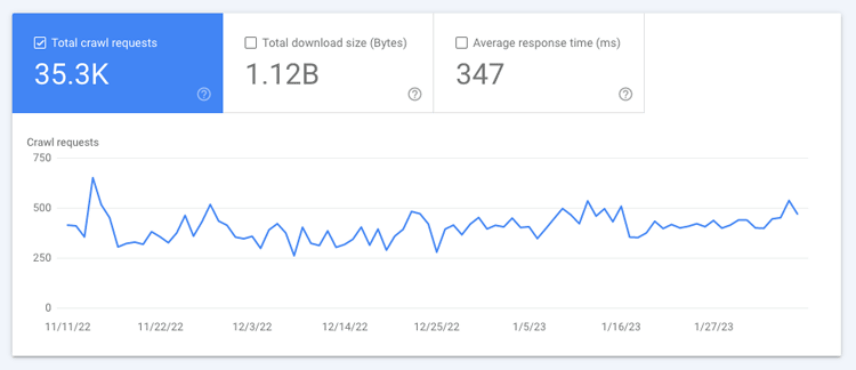At a basic level, search engine optimization (SEO) is the practice of improving a website's ranking in search engine results pages (SERPs). And there are many moving parts in the attempt to increase visibility and drive organic reach. An often overlooked but powerful tool for SEO is the examination of log files. Let's explore the benefits of examining log files for SEO.
What is Log File Analysis?
Log file analysis is a technical SEO process examining server-generated files from visitors and web crawlers. These log files typically contain information about various events on a website or application, such as page views, user interactions, errors, and system activity.
By analyzing server logs, you can track user behavior, monitor performance, detect security issues, and optimize your website. The process of log file analysis involves collecting, processing, and analyzing visitor data to identify trends, patterns, errors, and anomalies. The insights gained from your log files can be used to improve website or application performance, user experience, and security. There's an incredible amount of useful data to explore!
What Data is Typically Included in a Log File?
Log files can include technical data that provides insights into your website's performance and user behavior. The specific data included in a log file can vary depending on the source of the log data and the type of log file being analyzed. There are typically two types of log files -- access logs and error logs.

Some common types of data that are often included in log files are:
- Timestamp: The date and time of each log event.
- IP address: The IP address of the user or device generating the log event.
- User-agent: Information about the device, browser, or crawler making the request (e.g., GoogleBot, bingbot).
- HTTP status code: The status code returned by the server in response to an HTTP request (e.g., 200, 404, 503).
- Request method: The type of HTTP request made (e.g., GET, POST, PUT, DELETE).
- Request URL: The URL of the requested page or resource.
- Referrer URL: The URL of the page linked to the requested page.
- Query parameters: Any additional information included in the URL query string.
- Error messages: Any error messages generated by the server or application.
This is by no means an exhaustive list, but it gives you a good idea of the types of technical data that can be included in log files. The specific data included in a log file will depend on the specific log format and the log analysis software used to process the data.
Tracking User Behavior
Log files can provide a wealth of information about how visitors interact with your website. This includes information about the pages they visit, the time they spend on each page, and the paths they take to navigate your site. By understanding how users interact with a website, SEOs can identify areas for improvement and optimize the user experience (UX).
For example, users may fall off on a certain page, or equally important, where search engine bots and crawlers get stuck. Managing and understanding the crawl budget is a separate but highly relevant component when examining your log files. Basically, search engine crawlers that waste time on non-indexable pages need to be addressed.
In addition, log files can provide information about page load times on your website. A slow website can be catastrophic to UX. By examining log files and identifying areas for improving page load times, SEOs can take steps to optimize the website's performance and improve the user experience.
Debugging Visitor and Crawl Issues
The behavior of visitors and crawlers will ultimately lead to potential issues that require further investigation. When you examine log files, you can identify technical issues affecting your website's performance. This can include broken links, crawl errors, and slow page load times. Addressing these issues is essential for the overall health of your website.
While it can be tedious, fixing the technical issues in your log files is critical to a high-performance website.
Monitoring Referral Traffic
Log files can also show the referral sources of website traffic, including search engines, social media platforms, and other websites. This information is crucial for determining the most effective channels for driving traffic to a website. Unfortunately, many websites have started to use rel="noreferrer" in their links, so getting the exact referring URL can be difficult. However, the referring domain will still be available in most cases.
By understanding which referral sources generate the most traffic, SEOs can make informed decisions about allocating resources for ongoing SEO efforts and marketing.
Identifying Crawl Efficiency
I briefly touched on this above, but crawl budget and efficiency are critical for ongoing visibility and performance. Not only can log files provide information about how often search engine robots are crawling a website, but also how long it takes them to do so.
You can get a quick snapshot of your crawl statistics directly in Google Search Console by navigating to the Settings section.

This information can be used to identify areas for improvement in the website's crawl efficiency. How? By making sure there isn't crawl budget wasting happening. A site should have clear information architecture (IA), not only for the user but also for crawlers.
By making a website more crawl-friendly and improving efficiency, SEOs can ultimately improve their website rankings.
Measuring Success
When compiled over time, log files can also provide data on your website's traffic, including the number of visitors, the pages they visit, and the duration of their visits. This information can be used to measure the success of SEO efforts and identify areas for improvement. By tracking these metrics over time, SEOs can see the impact of their efforts and make informed decisions about optimizing future strategies.
Additionally, viewing log files can sometimes show the links pointing to a website, including internal and external links. This information can be used to identify any broken links that may be affecting a website's performance, as well as to optimize the website's link structure for maximum benefit. Well-structured internal linking is an important factor in SEO, and log files can provide valuable insights into how to improve your website.
Security and Detecting Hacking Attempts
Finally, log files are absolutely essential in understanding the security of your website, including attempts to exploit vulnerabilities or inject malicious code. Detecting and addressing these attempts is a must for the security and reputation of your website. While not particularly for SEO, regularly examining log files can keep you far ahead of potential security threats and protect your website's reputation.
Which Software Tools Provide Log File Analysis?
So, how do you get started with log file analysis, and which software should you use? Several software tools can help with log file
analysis, including open-source and commercial solutions. Some options I've used:
- Terminal: Without a doubt, this is my go-to for quick log file analysis.
- Graylog: An open-source log management platform with centralized logging, alerting, and reporting features.
- ELK Stack: My preference is Logz.io, and each of these provides a combination of open-source tools, including Elasticsearch, Logstash, and Kibana.
- Screaming Frog: A website crawling tool that can analyze website log files and provide insights into website performance and optimization.
- SEMRush: A comprehensive digital marketing suite with a log file analyzer tool as part of its suite of SEO tools.
The best software for you and your organization will depend on your specific needs, such as the volume of log data you need to manage, the types of log sources you need to collect from, and of course, your budget.
Final Thoughts
Examining log files is a powerful tool for SEO that should not be overlooked.
From tracking user behavior to measuring success, understanding link structure, detecting security vulnerabilities, and improving website speed, log files provide valuable insights that can be used to improve a website's performance and visibility in search engine results.
Whether you're a seasoned SEO professional or just getting started, regularly examining log files can help you make informed decisions and increase your search visibility.
Are you unsure how to examine log files, or do you need professional help? Feel free to contact us and reach out! We would be happy to discuss your specific technical SEO needs.



